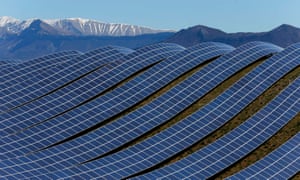Europe's greenhouse gas emissions fall to record low
Member states report a 23% drop since 1990, but the pace is slowing and several countries have missed renewable and energy efficiency targets


A huge solar installation in Les Mees, in the department of Alpes-de-Haute-Provence. France is predicted to miss both renewable and energy efficiency targets. Photograph: Jean-Paul Pelissier/Reuters
Greenhouse gas emissions in Europe have plunged to the lowest level ever recorded after the EU’s member states reported an estimated 23% drop in emissions between 1990 and 2014.
The bloc has now overshot its target for 2020 of cutting emissions by one-fifth – at the same time that its economy grew by 46%, according to the EU’s climate chief, Miguel Arias Canete .
“We have shown consistently that climate protection and economic growth go hand-in-hand,” he said. “This is a strong signal ahead of the Paris climate conference.”
Diplomats are currently meeting in Bonn to try to thrash out a negotiating text for the Paris summit, amid concern that a slimmed-down 20-page proposal has crept back up to 34 pages, following objections from developing countries.
Negotiators in Bonn are likely to note that the pace at which Europe is greening its economy is stalling, according to the European Environment Agency (EEA), which collated the report. It projects that on current trends, EU emissions cuts will slow to 24% in 2020 and 27% in 2030.
This is substantially below a 40% emissions cut that EU states signed up to last October. Further measures planned by EU countries could add up to 3% to those figures, but new policies will also be needed before 2030, the report says.
“To achieve our longer-term goals for 2030 and 2050, a fundamental change is needed in the way we produce and use energy in Europe,” said the EEA’s director Hans Bruyninckx .
The new figures show that eight countries are on track to miss their binding renewable energy targets for 2020 – including the UK, Ireland and Spain.
The same number of states looks set to botch a 20% improvement in energy efficiency performance, with Germany, France and the Netherlands all underperforming.
France, the host of next month’s climate summit, is predicted to miss both targets. Austria, Belgium, Ireland and Luxembourg are also predicted to flunk the 2020 emissions target.
Britain, however has cut emissions 35% since 1990, according to the EEA figures, which may be revised pending official data submissions to the UN in 2016.
Eastern European countries registered even steeper falls, due to the post-Soviet Union collapse of their heavy industries. Romania’s emissions fell by 56% and Lithuania’s by almost 60%.
The EEA attributes the overall emissions drop to a combination of factors - economic recession, climate policies, measures to tackle fluorinated gases and a warm 2014, in which emissions dropped 4% overall.
The study says that it will be “challenging” for the EU to achieve its 2030 goals of a 27% share of renewables in its energy mix, and 27% energy efficiency improvement.
Even if this is achieved, European countries will still have to double or even triple their emissions cutting efforts after 2030 to get onto a path that could limit global warming to 2C by mid-century.
Environmentalists called for a review of the EU’s Paris pledge.
“The news that the EU is on track to significantly overachieve its 2020 climate target means Europe can afford to move beyond its cautious offer for 2030, which doesn’t factor in this higher starting point,” said Louisa Casson, a spokesperson for the green thinktank E3G.
Comments